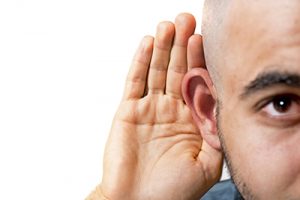 There are more than 48 million Americans of all ages with some degree of hearing loss. Signs of loss include people sounding as if they are mumbling, turning up the volume on the TV or listening to music louder than others need it, difficulty hearing in noisy environments, ringing in the ears, sensitivity to sound and speech delays in children.
There are more than 48 million Americans of all ages with some degree of hearing loss. Signs of loss include people sounding as if they are mumbling, turning up the volume on the TV or listening to music louder than others need it, difficulty hearing in noisy environments, ringing in the ears, sensitivity to sound and speech delays in children.
Types of Hearing Loss
There are three types of loss of hearing. Conductive loss is hearing loss that originates with problems in the ear canal, eardrum or middle ear that prevent sounds from being conducted through the ear. Sensorineural loss is hearing loss that originates from problems with the inner ear that prevent sounds from being sensed by the auditory system. Mixed loss is a combination of conductive and sensorineural hearing loss.
Though most adults will experience sensorineural loss as they age, the most common cause of loss of hearing is exposure to loud noises. Other causes of sensorineural loss include head trauma, genetic hearing loss or malformations of the inner ear. Conductive hearing loss causes include fluid in the middle ear from a cold, ear infections, allergies, poor Eustachian tube function, perforated eardrum, benign tumors, impacted earwax and foreign bodies in the ear.
Hearing Loss Treatments
Loss treatments will depend on the individual and the cause. Common treatments include removing impacted earwax, surgical procedures that remove blockages or insert tubes that help the ears drain fluid, hearing aids that amplify sound and hearing implants that give patients the sense of sound.
Most adults wait an average of seven years before seeking help for their hearing issues; however, many studies have shown that untreated loss leads to several other problems. If left untreated, hearing loss can lead to social withdrawal, depression and declining brain health.
Please contact our office at (717) 728-9700 to schedule an appointment for an ENT consultation if you or someone you care for is experiencing hearing loss.
